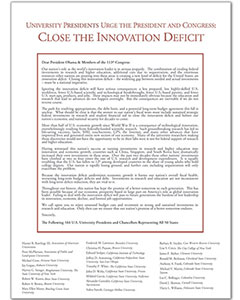 SUNY Chancellor Zimpher and the presidents of SUNY’s four university centers today joined higher education colleagues nationally in a call on Congress and President Barack Obama to close the “innovation deficit” – the widening gap between needed and actual federal investments in research and education.
SUNY Chancellor Zimpher and the presidents of SUNY’s four university centers today joined higher education colleagues nationally in a call on Congress and President Barack Obama to close the “innovation deficit” – the widening gap between needed and actual federal investments in research and education.
Chancellor Zimpher, University at Albany President Robert J. Jones, Binghamton University President Harvey G. Stenger, University at Buffalo President Satish K. Tripathi, and Stony Brook University President Samuel L. Stanley are among the signees of an open letter published that says investments in those areas lead to the types of innovation and new technologies that power the nation’s economy, create jobs, and reduce the budget deficit while ensuring that the U.S. maintains its role as global leader.
“Throughout our history, this nation has kept the promise of a better tomorrow to each generation,” the letter states. “This has been possible because of our economic prosperity based in large part on America’s role as global innovation leader. Failing to deal with the innovation deficit will pass to future generations the burdens of lost leadership in innovation, economic decline, and limited job opportunities. We call upon you to reject unsound budget cuts and recommit to strong and sustained investments in research and education. Only then can we ensure that our nation’s promise of a better tomorrow endures.”
 The letter is published in Politico.
The letter is published in Politico.
The universities represented in the letter are members of the Association of Public and Land-grant Universities and/or the Association of American Universities.
The letter comes as Congress faces critical budget decisions in the coming months. Annual funding bills, the debt limit, and measures to eliminate or modify the deep across-the-board spending cuts forced by sequestration could all be taken up this fall. While the legislative path for those measures remains unclear, higher education leaders note that targeted investments in research and higher education must be made, as they are key sources of long-term economic growth and fiscal stability.

